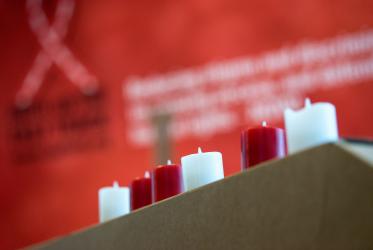As participants in a workshop on HIV offered their personal reflections, they shared how their hearts have been deepened and changed by a dialogue facilitated by the National Council of Churches in the Philippines (NCCP).
The women participants, from all over the country, are clergy, lay leaders, theologians and seminarians from NCCP member churches. Some are living with HIV. They affirmed that the contextual Bible study (CBS) approach taught them how to study the Bible and relate it to the present context. They also shared how a pro-SAVE (Safer practices, Access to treatment, Voluntary Counseling and Testing, Empowerment) approach helped widen their perspective even further.
“I realized that HIV is not all about homosexuality. Sexuality must be studied more because, in the Filipino context, most people are in denial regarding this issue. It is one of the basics talking about HIV and AIDS to inspire and encourage vulnerable people to embrace them with love and acceptance and to bring God’s hope through this issue,” said a pastor from the United Methodist Church (UMC).
“It is easy to say how you have been stigmatized but is hard to answer how you have stigmatized others,” added a lay leader from the Convention of Philippine Baptist Churches (CPBC).
“Bible studies challenged me as a church worker — helped me to think deeper and lead me to other ideas and new perspectives that opened my heart and mind,” said a lay leader from the Lutheran Church in the Philippines.
Women’s rights in focus
Participants said CBS helped them understand women’s rights in the context of their faith.
“Before, I know that women should be under the roof of a man’s power. There are certain limitations to what women can do, but for me it is totally different. I see that I have both done things which are suppressing what I can do as a woman. Now it is changed that there should be no hindrance to do things you want no matter what your gender is,” said a UMC lay leader.
A woman living with HIV agreed that women are strong enough to alleviate discrimination, stigma, oppression permanently but needed to be empowered and educated on their rights.
For a seminarian from the Episcopal Church in the Philippines (ECP), “Jesus revolutionized the role of women even during a time of acute patriarchy. It is refreshing to know that He is on the side of suffering women all along.”
Understanding LGBTI people
CBS and SAVE approach sessions also highlighted the plight of lesbian, gay, bisexual, transgender, and intersex (LGBTI) people.
Part of the sessions conducted were the alternative approach to the story of Sodom and Gomorrah that suggested a fresh reading based on literary analysis of the Hebrew text and the contextual bible study on Judges 19:1-30 that aimed to recognize diverse male sexualities and to challenge gender-based violence.
“I really don’t have problems with LGBTI people. What bothers me most is how other people treat them. After the workshop I really have the best wish I could beg that people will open their eyes to them; they should be left open and accepted,” said a youth leader from the United Church of Christ in the Philippines (UCCP).
The sessions allowed participants to affirm the diversity of human sexuality.
“A person does not choose what he or she feels. Whether we are attracted to a man or a woman, it is not a problem to fix. God created us beautiful and wonderful,” said a UMC pastor.
“They are also humans and they are also created in the image of God. Sex organs do not determine our sexual and gender orientation,” added another youth leader from UCCP.
For a seminarian from the Iglesias Filipina Independiente: “All I know is there is nothing wrong in love, no matter who you are.”
Compassion for people living with HIV
“Before I considered people living with HIV as unfortunate. The situation of people living with HIV is a call to church that we must take an action to save more lives and that salvation of people living on heart is the priority and a mission of Christ,” said a lay leader from Iglesia Evangelica Metodista En Las Islas Filipinas.
A pastor from CPBC added that “it is not a punishment for them. Respect and understand them like Jesus did with marginalized people.”
Participants affirmed that people living with HIV are not to be isolated.
“… they should be the ones we help and encourage to stand firm and be comfortable and also to accept them as one of a whole part of us,” said seminarian from ECP.
World Council of Churches Ecumenical HIV and AIDS Initiative and Advocacy








